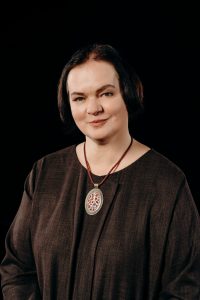Daiva Vyčinienė

Professor and Head of the LMTA Department of Ethnomusicology, Doctor Habilitatus of Humanities (h.p.). Teaching subjects: Performing Sutartinės; Supervision of Bachelor’s, Master’s, and Doctoral Theses. Foreign languages: English (C1), German (C1), Russian (C2).
Contacts
- Prof. Habil. Dr. (h.p) Daiva Vyčinienė
Department of Ethnomusicology, LMTA Faculty of Music
E-mail daiva.vyciniene@lmta.lt
Research and teaching activity
Biography: Daiva Vyčinienė (b. 1962) is Professor and Head of the LMTA Department of Ethnomusicology, an acclaimed ethnomusicologist, a renowned researcher of sutartinės (Lithuanian authentic polyphonic music performed by female singers) and performer, as well as a performer of other kinds of folk songs.
In 1985, she graduated from the Lithuanian Conservatory (now – the LMTA) with a degree in musicology (folklore) in the class of Laima Burkšaitienė. In 1989, she successfully completed postgraduate studies in folklore at the then Leningrad State Institute of Theatre, Music and Cinema (now – Russian State Institute of Performing Arts) under the supervision of Professor Izaly Zemtsovsky. In 1993, she defended her PhD dissertation in musicology, and in 2009, was awarded Doctor habilitatus. Daiva is a frequent participant of international exchange programmes Erasmus and Nordtrad.
In 1981-1996, Daiva Vyčinienė was a director of the folklore ensemble of the National M. K. Čiurlionis Art School. In 1985–1996, she was a member of the Vilnius New Music Ensemble (directed by Šarūnas Nakas) that had successful concert tours in European countries and Canada. In 1986, Daiva Vyčinienė joined folk ensemble Visi (directed by Evaldas Vyčinas) and since then has been performing together with the group. Since 1986, Daiva has been the director of Trys keturiose, a group of singers performing sutartinės. The ensemble gives numerous concerts all around the world.
Daiva Vyčinienė has worked together with composers Algirdas Martinaitis, Rytis Mažulis, Remigijus Merkelis, Mindaugas Urbaitis and many others. She has been eagerly presenting music projects that join contemporary music and sutartinės not only in Lithuanian festivals, but also in England, Austria, Belgium, Poland, Lithuania, Germany, Japan, and the USA. Daiva Vyčinienė is one of the organisers of the international folk music festival Skamba skamba kankliai and leads numerous folk music singing courses.
Daiva Vyčinienė is known for being an enthusiastic researcher: an author of three scientific monographs, she has written applied publications and over a hundred scholarly papers. Besides, Daiva is a compiler of as many as 15 CDs and DVDs. Daiva Vyčinienė is a member of international organisations such as the International Council for Traditional Music (ICTM), the European Seminar in Ethnomusicology (ESEM), Research Centre for European Multipart Music (EMM), and the International Research Centre for Traditional Polyphony (IRCTP). Daiva Vyčinienė possesses extensive experience as an expert: she is a member of the Lithuanian Composers’ Union as well as numerous editorial boards of such academic journals as Lietuvos muzikologija (The Lithuanian Musicology), Būdas (The Way), Finno-Ugric World, Bulletin of Kyiv National University of Culture and Arts. Series in Musical Art, and Lietuvos valsčiai (The Lithuanian Counties).
Daiva Vyčinienė is famous for her merits and achievements in culture. She is a laureate of Jonas Basanavičius State Prize (2002) and Honorary Professor of the Vano Sarajishvili Tbilisi State Conservatoire. Thanks to Daiva Vyčinienė’s work and enthusiasm, in 2010 sutartinės, Lithuanian multipart songs were included in the UNESCO Representative List of the Intangible Cultural Heritage of Humanity. She was awarded the Lithuanian Composers’ Union Prize (2019) for the promotion of sutartinės on the international scale and for the width of her research in the monograph Sutartinių audos (The Weave of Sutartinės). In 2021 she was awarded the National Prize for Culture and Art for increasing the relevance of folklore studies.
